- Home
- slideshows
- miscellaneous
- I drove a $76,000 Cadillac XT6 and $70,000 Lincoln Aviator in a battle of three-row American luxury SUVs - and the winner was clear
I drove a $76,000 Cadillac XT6 and $70,000 Lincoln Aviator in a battle of three-row American luxury SUVs - and the winner was clear
Let's start with the 2020 Lincoln Aviator — one of several redesigned SUVs that Ford's luxury division has rolled out in the past few years.

I picked up my Aviator tester near Los Angeles International airport. It was an all-new, Aviator GT hybrid. The SUV starts a little north of $50,000, but my well-equipped version, although officially not for sale, probably tipped the cost scales at more than $70,000.
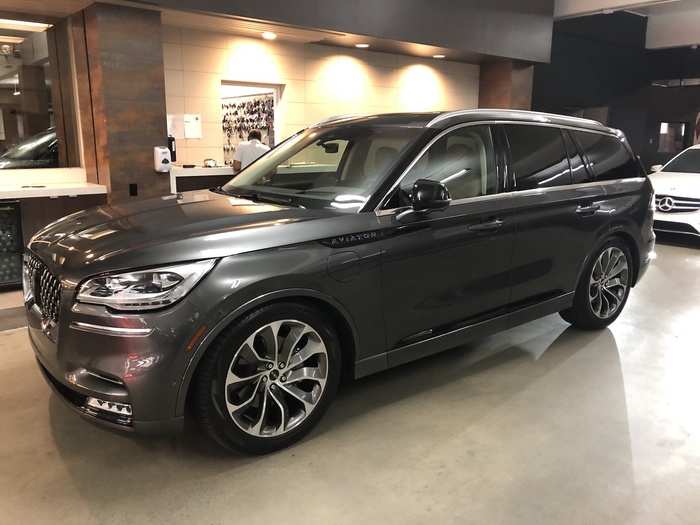
Because I was in LA for the annual auto show, a rite of autumn, I had the chance to test the cargo capacity of this three-row hauler right away. With the third row deployed, there was a goodly amount of space for my luggage.
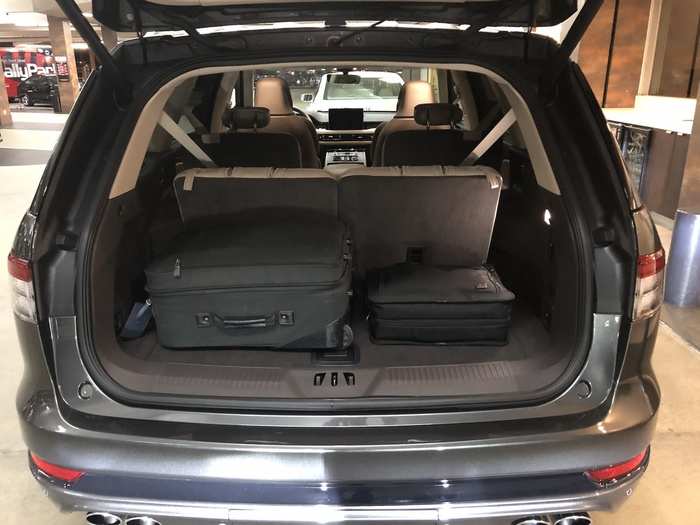
The Aviator is an extremely nice-looking midsize SUV, embodying what Lincoln calls its "quiet flight" brand philosophy, which combines seafaring and airborne motifs.
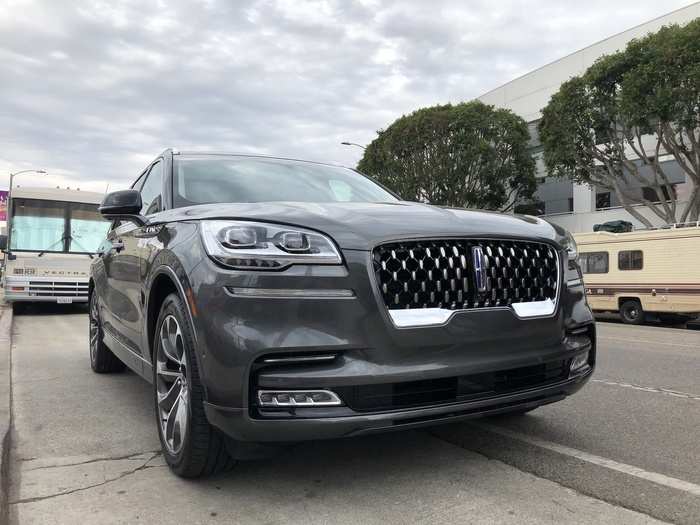
The Aviator's "Magnetic Gray Metallic" paint job added a stately aspect to the sort of vaguely steampunk aesthetic. That's Frank Gehry's famous Binoculars Building in Venice, by the way. The iconic sculpture is by iconic Claes Oldenburg and Coosje van Bruggen.
This isn't a small SUV, to be sure, but with dashing character lines and a sloping roof, it comes off as almost sleek.
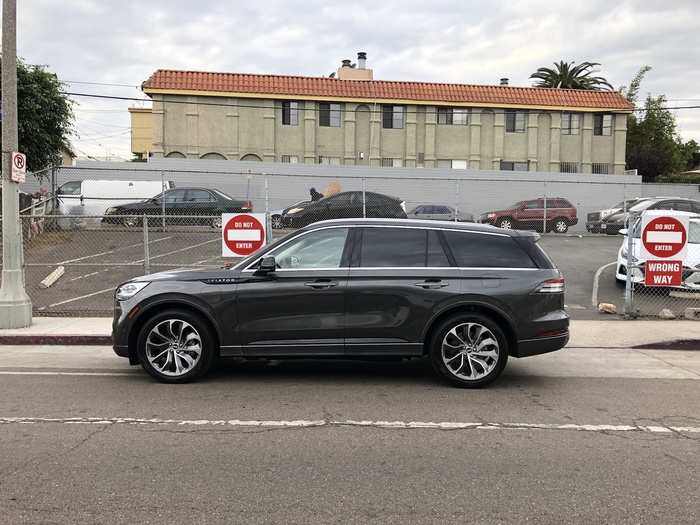
The Aviator nameplate, rendered in a distinctive blue color and a sans serif typeface, add to the Jazz Age vibe.

Lincoln is in the midst of a robust revival. The Aviator is among the latest in a new lineup of SUVs.
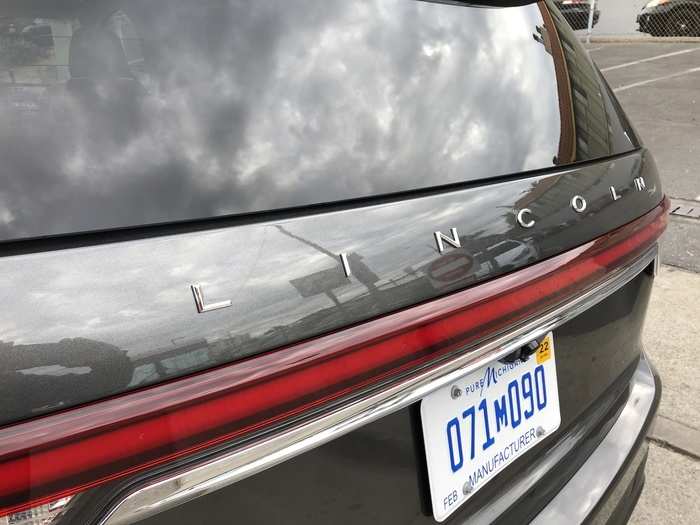
The grille is "Dark Smoke Chrome," and it's lovely. The Lincoln badge is proud and prominent. Under the hood is a 3.0-liter V6, mated to a smooth 10-speed automatic transmission.
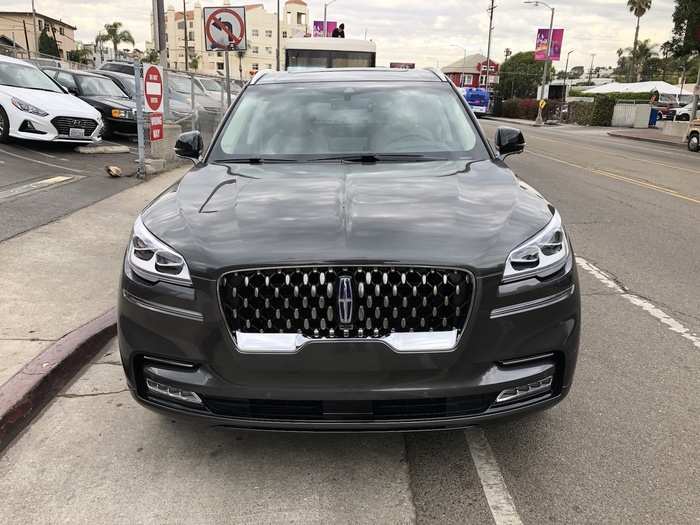
Even from the rear, the Aviator presents a sharp appearance — and that's the toughest trick for an SUV to pull off.
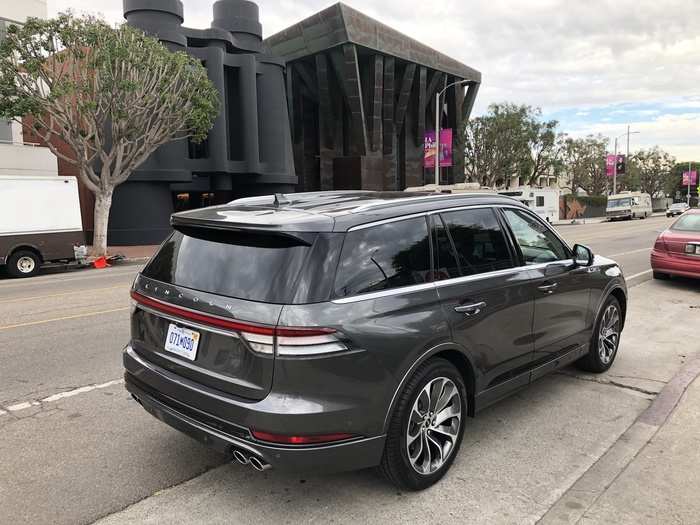
We live in the golden age of mega-sunroofs — or in this case, "panoramic vista roofs."

Lincoln's seats are something else. Covered in "Sandstone" for my Aviator, they're 12-way-adjustable up front, and heated and cooled.
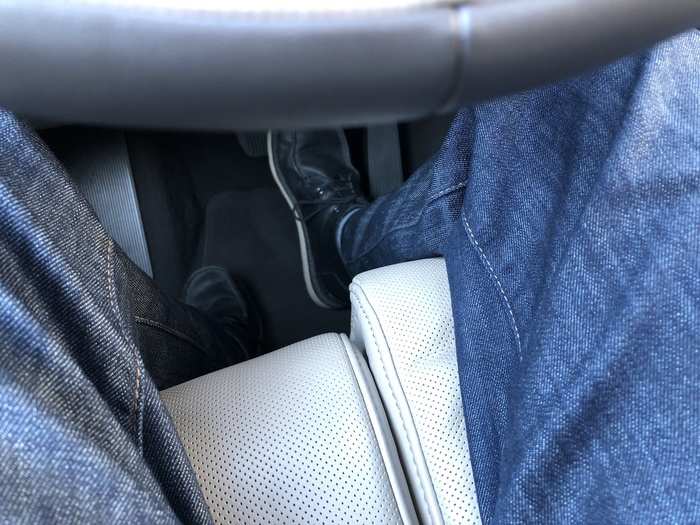
Second-row legroom is quite good for a midsize SUV.
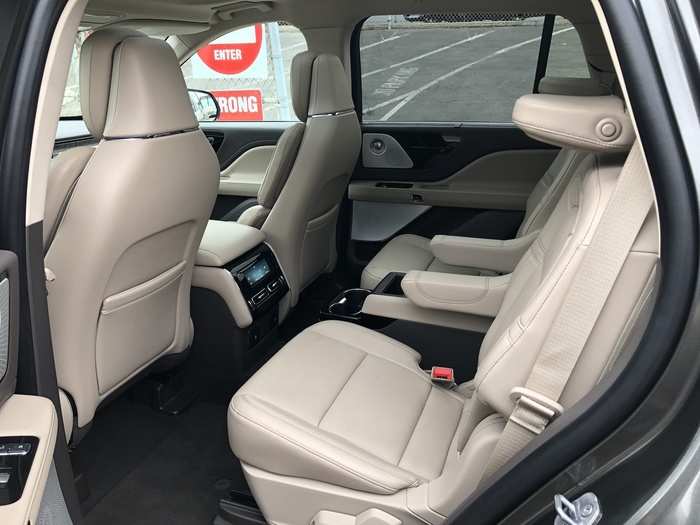
The Aviator's rear seats also have their own climate and infotainment controls.
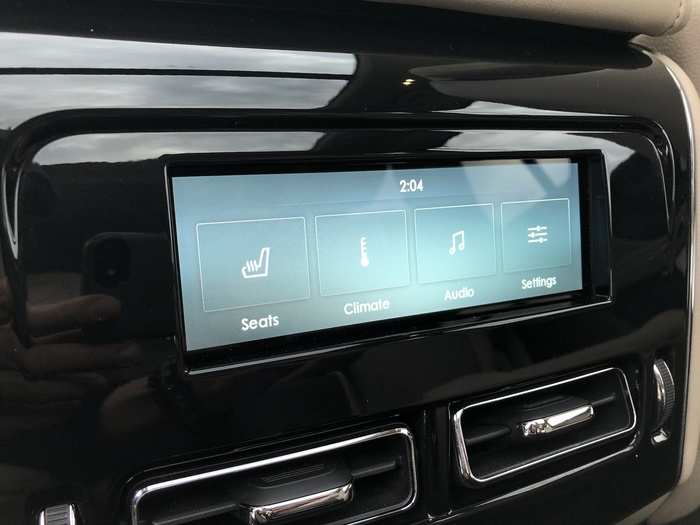
The third row, while snug, is actually rather luxurious.
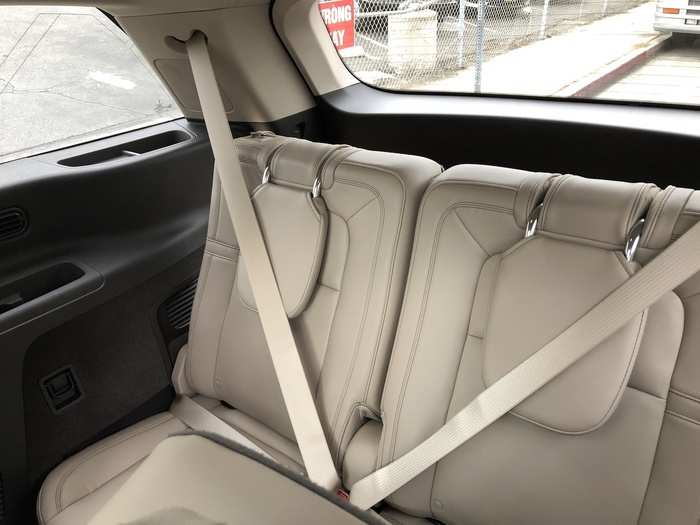
My tester's multifunction steering wheel was leather-wrapped and two-tone.
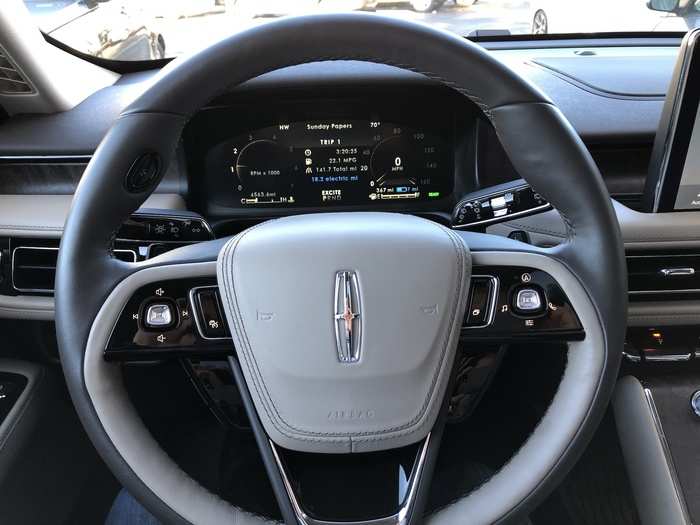
The wood-grain trim is beautiful, and the drive-selector is easy to find.
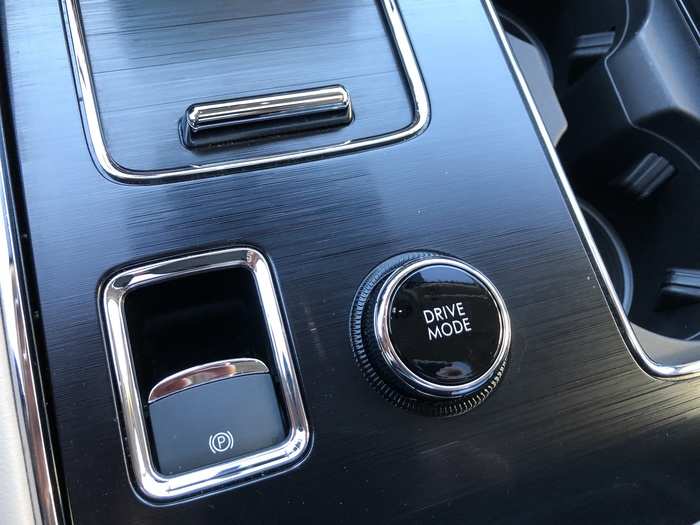
Drive modes are artfully indicated with animations, sort of like performance GIFs. The drive modes are "Normal," "Conserve," "Excite," "Slippery" and "Deep Conditions." In LA, I used four of the five. I guess if I'd driven on the beach I could have used "Deep Conditions."
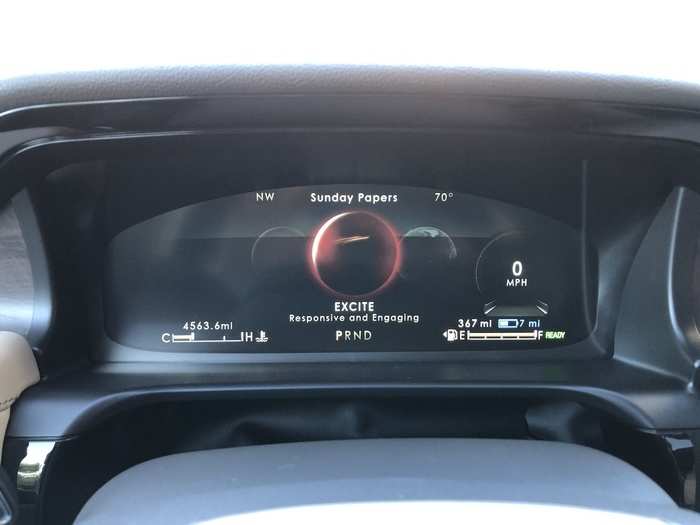
The infotainment system runs on a reasonably large central touchscreen and uses Lincoln/Ford's SYNC 3 setup. It does everything well, from Bluetooth device pairing to GPS navigation.
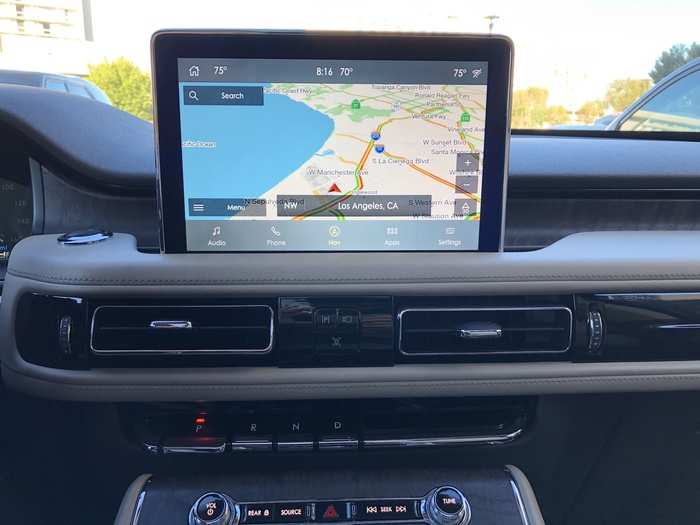
Yep, the Aviator GT is a plug-in hybrid, with a 75-kilowatt-hour motor on the rear axle, plus a small battery, that adds about 20 miles of all-electric range. What the hybrid system really does is punch up the performance of the turbocharged V6, bringing its output to nearly 500 horsepower with gobs of torque on offer.
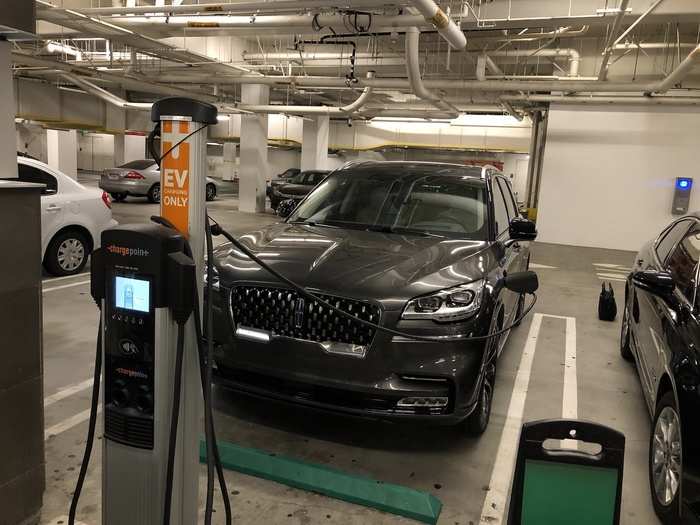
I re-juiced the Aviator twice (using a ChargePoint location), and each time it took about six hours to go from zero to full. (Level 2 charging, at 240 volts, should replenish the charge in about two hours, but I left the Aviator plugged in for extended periods if time and didn't closely monitor the re-juicing.)
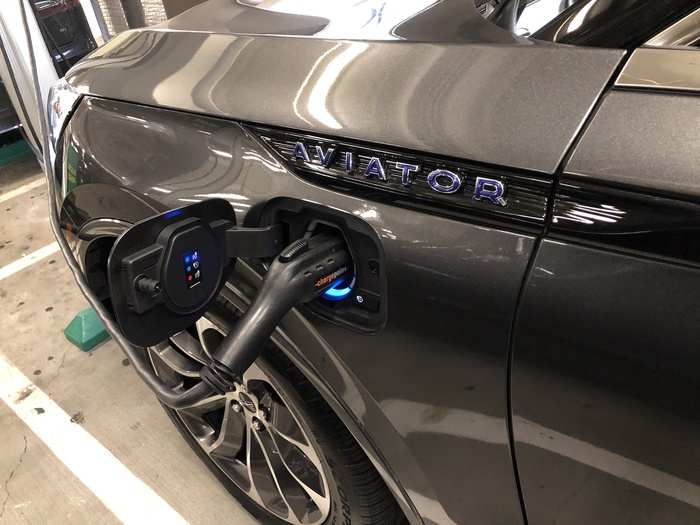
My 2020 Cadillac XT6, in "Premium Luxury" trim, arrived just as an early snowstorm had blanketed out suburban New Jersey test center in white.
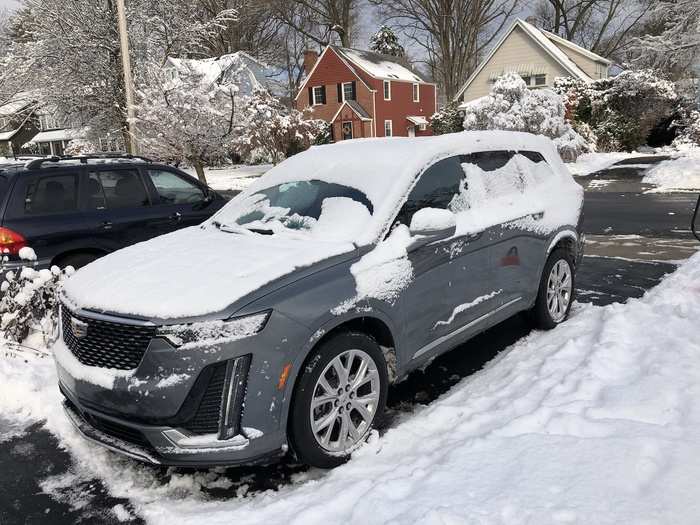
The snow hid the handsome "Satin Steel Metallic" paint job.

On balance, the XT6 wears its size well. However, the rear is crimped, while much of design action is up front. My tester rode on 20-inch wheels, a welcome $2,000 extra.
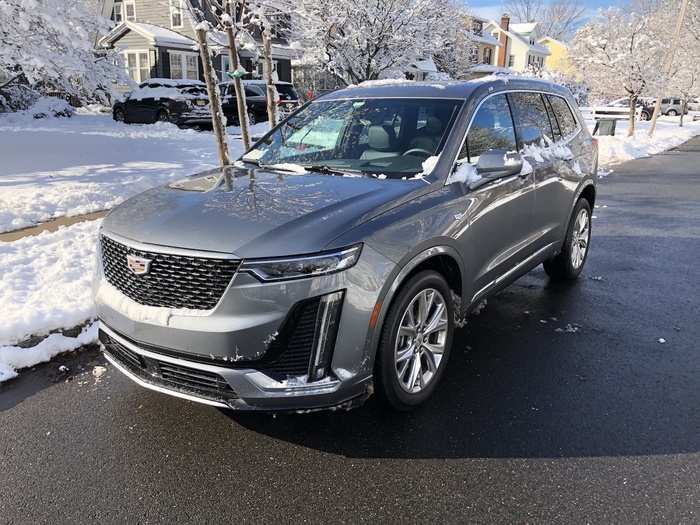
With only about 13 cubic feet of cargo space available with all three rows in action, the XT6 is challenged for roads trips that might involve the entire family. It's also difficult to pack a lot of groceries in here.
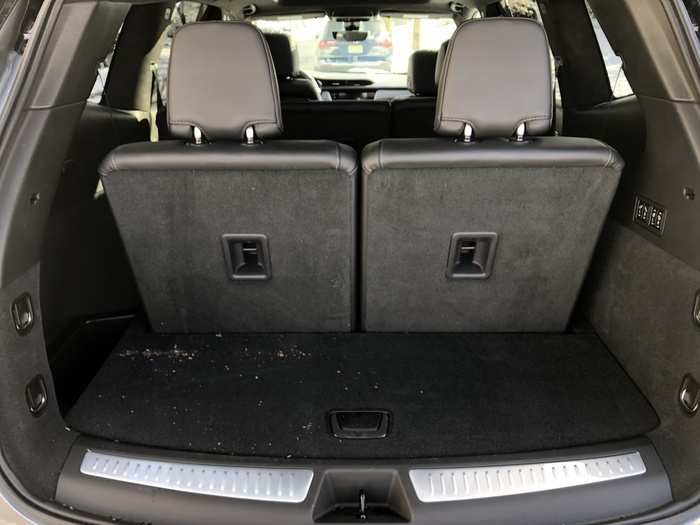
But with the seats dropped and the space opened up, you have almost 80 cubic feet to work with. I have three kids, and when we all travel in one of these vehicles with our luggage, we typically end up dropping on of the third-row seats.

Here's a problem: the single engine option is a naturally aspirated 3.6-liter V6, making 310 horsepower. This is a competent motor, and its gets along well with the nine-speed automatic transmission. But some customers might find it slightly underpowered.
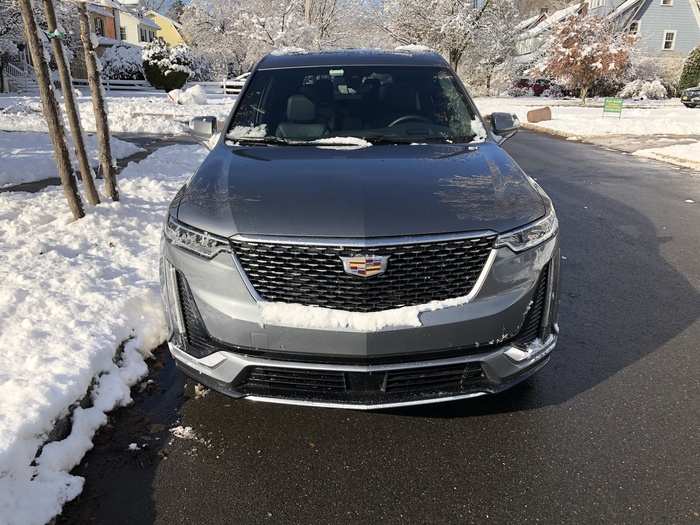
Fuel economy is so-so: 17 mpg city/24 highway/20 combined. What hurts the XT6's MPGs is the all-wheel-drive system and and sheer weight of the vehicle, 4,700 lbs.

The iconic Caddy shield lost its wreath a long time ago. My Cadillac XT6 enjoyed a Platinum package upgrade that endowed the interior with extra loveliness — for about $5,000 more. In all, my tester had close to $20,000 tacked on to the base price of $54,695.
The Cadillac XT6's design is consistent with the brand's more subdued, stately SUV presentation. The drawback is that the XT6 doesn't exactly pop visually.
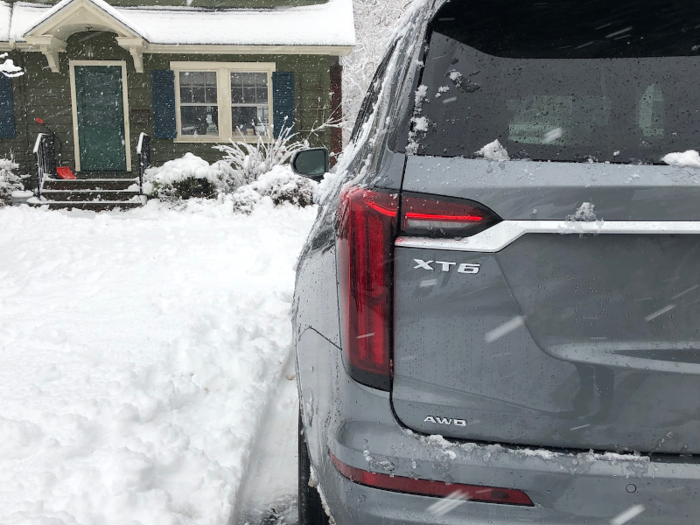
The rear integrated spoiler is dashing but also perhaps a little useless.

Let's get out of the snow and into the XT6's "Jet Black" interior. Whatever reservation I might have had about the exterior vanish once I buckle up. Cadillac has developed an interior-design philosophy that's premium without being blingy, and that joins luxury styling cues with an abundance of useful technology.
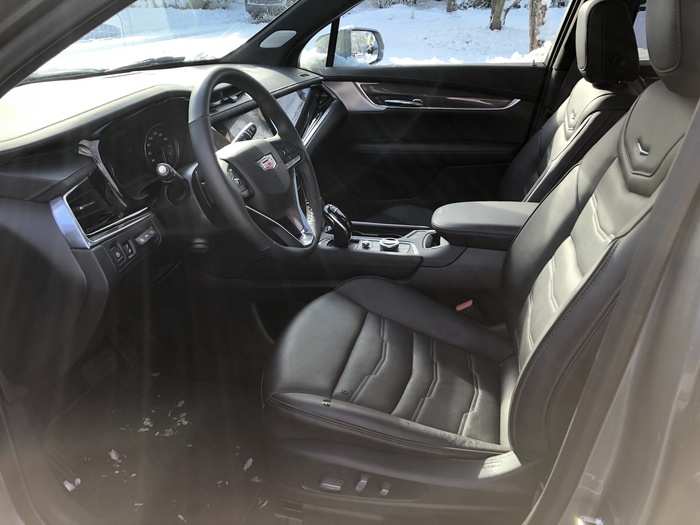
Rear legroom is fairly good, but again, cramming an entire additional row into the XT6 means some comfort compromises for adult-size humans.
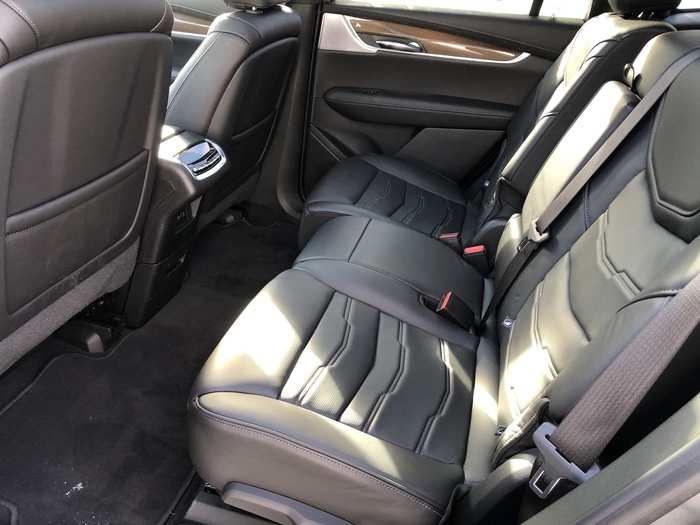
The third row is ... cozy. And not as luxe as the Aviator's.
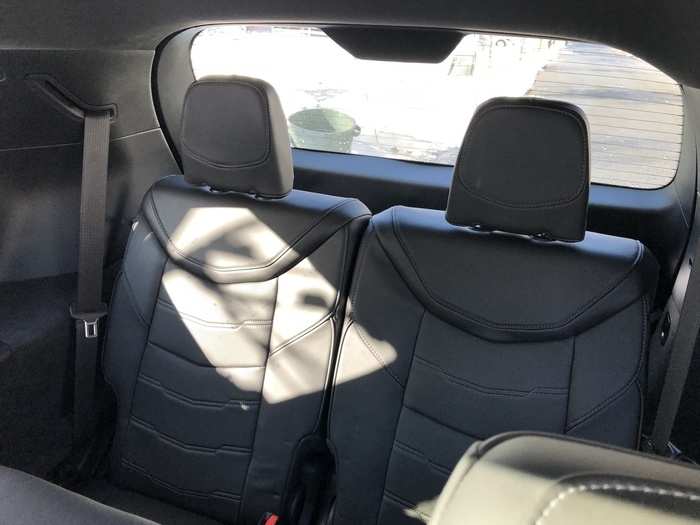
Let's face it: midsize three-row SUVs are bundles of imperfection. But the XT6's interior checks off the luxury boxes and offers a counterpoint to, say, the razzle-dazzle one might find in a Mercedes.

Multi-function steering wheels are a common sight these days. The XT6 also features an analog-digital instrument cluster and head-up display, as well as the best night-vision technology in the industry.
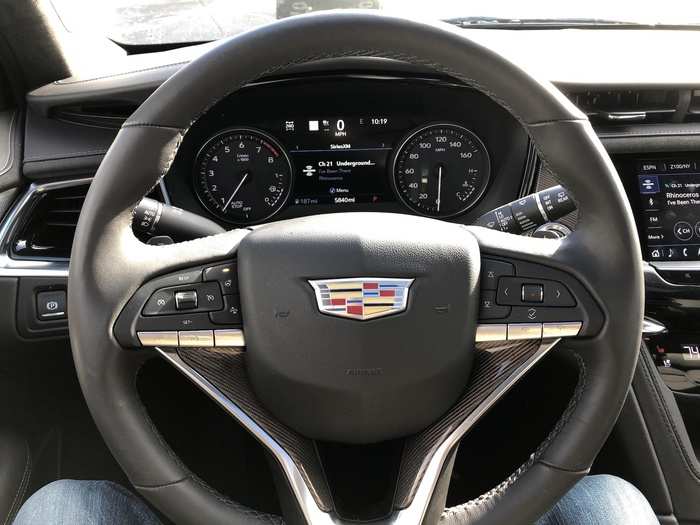
The infotainment system is the much-improved Cadillac Cue, now among an industry standard-setter for connectivity, device integration, and 4G LTE technology piped through OnStar.
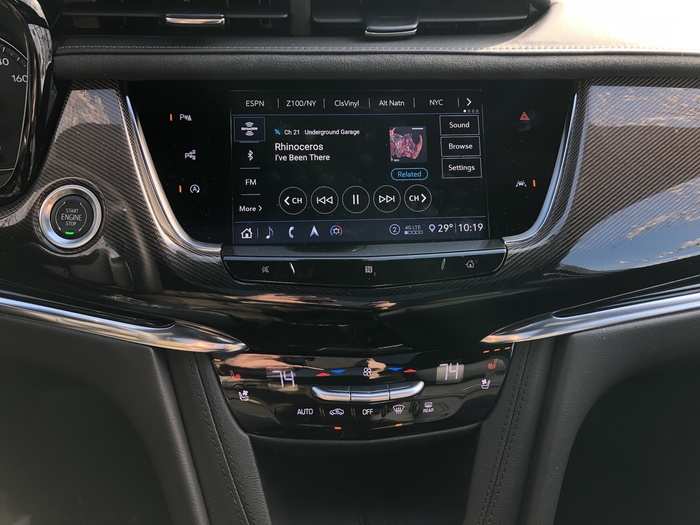
The eight-inch screen is crisp and responsive. But It's also on the small side for the segment.
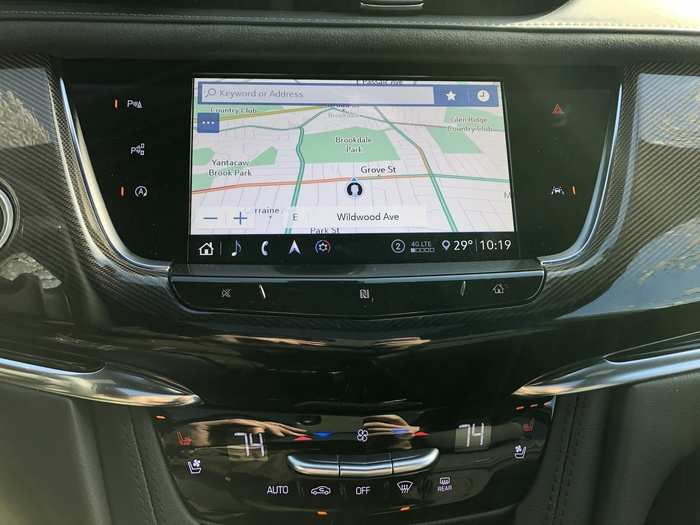
The system used to be touch-screen only, but Caddy has added a buttons-and-knob interface to enhance safety. It works well and improves an already excellent setup.
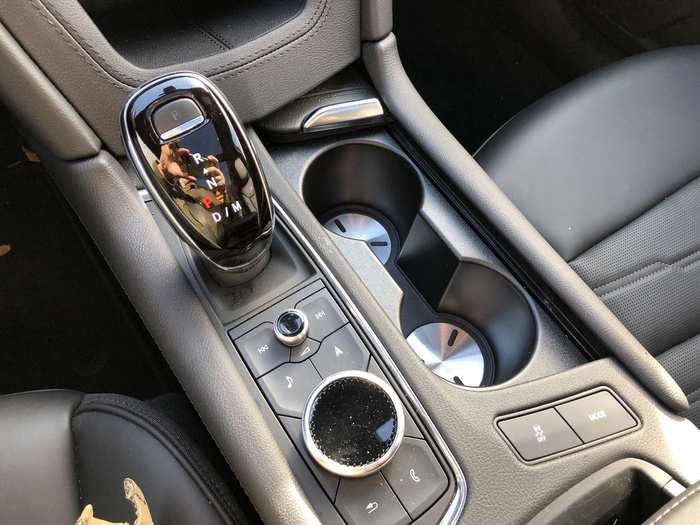
My Cadillac XT6 tester was equipped with a magnificent Bose Series 14 premium audio system.
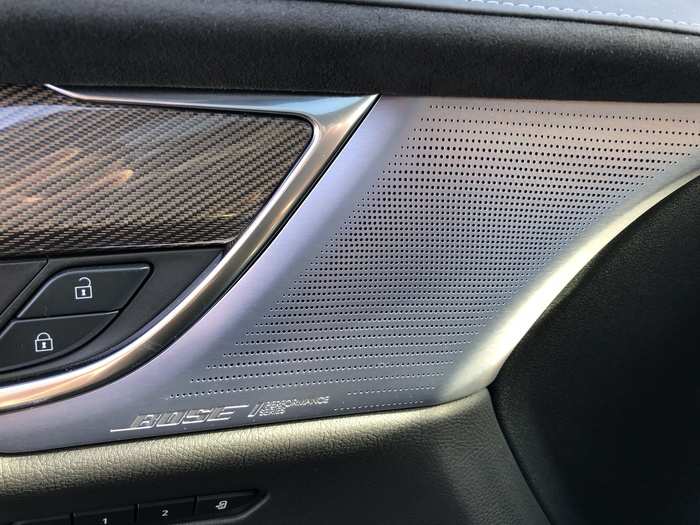
At about $55,000, I think the XT6 is worth a look. But once the options take the price tag north of $70,000, the vehicle's flaws become more difficult to ignore.

And the winner is the Lincoln Aviator!

For the record, the Lincoln's victory had nothing to do with the hybrid drivetrain, which ultimately didn't offer a differentiating amount of all-electric performance, nor the LA weather. Even the $6,000-as-tested price gap didn't figure strongly into my calculus.
The Lincoln won because it's straight-up better as an SUV — although both the Aviator and the XT6 are evidence that GM and Ford absolutely have their acts together in this exceptionally competitive and lucrative market segment.
What truly makes the Aviator stand out is a combination of design and surprising burliness, versus the XT6's more conservative looks and in my analysis somewhat underwhelming engine.
"[T]he all-wheel-drive system struggled a bit in my testing, which happened during some truly awful weather," I wrote in my original XT6 review. "I think this was due mainly to the vehicle being on all-season tires, but I also thought that the 310-horsepower engine, making 271 pound-feet of torque, wasn't quite up the task of spinning all four wheels on a fairly heavy vehicle."
The all-motor V6 in the XT6 simply gives up too much to the turbo-six in the Aviator — almost 200-horsepower too much with the hybrid Aviator — and you feel it every time you put the pedal down. Now, mind you, my Aviator tester didn't come with a fuel-economy rating, but word in the street is that the two vehicles are more-or-less the same in the MPG department.
The Lincoln also has the edge on the Caddy looks-wise and interior-wise. The XT6 is certainly handsome, and the interior is elegantly restrained, but the Aviator presents an exterior personality, and its interior is properly luxe, as opposed to near-luxe in the Caddy.
Admittedly, both the XT6 and the Aviator suffer from the three-row SUV curse: the third row is useless for adults, and when deployed, it kills cargo space.
But the Aviator makes up for that fundamental problem by being pretty great, while the XT6 is simply good.
"Nothing else I've driven in the segment feels quite the same," I wrote of the punching-above-its-weight Lincoln. "The Aviator is supposed to be suave, but it's kinda wild. I hope the new Aston Martin DBX SUV can manage this stunt."
Popular Right Now
Popular Keywords
Advertisement